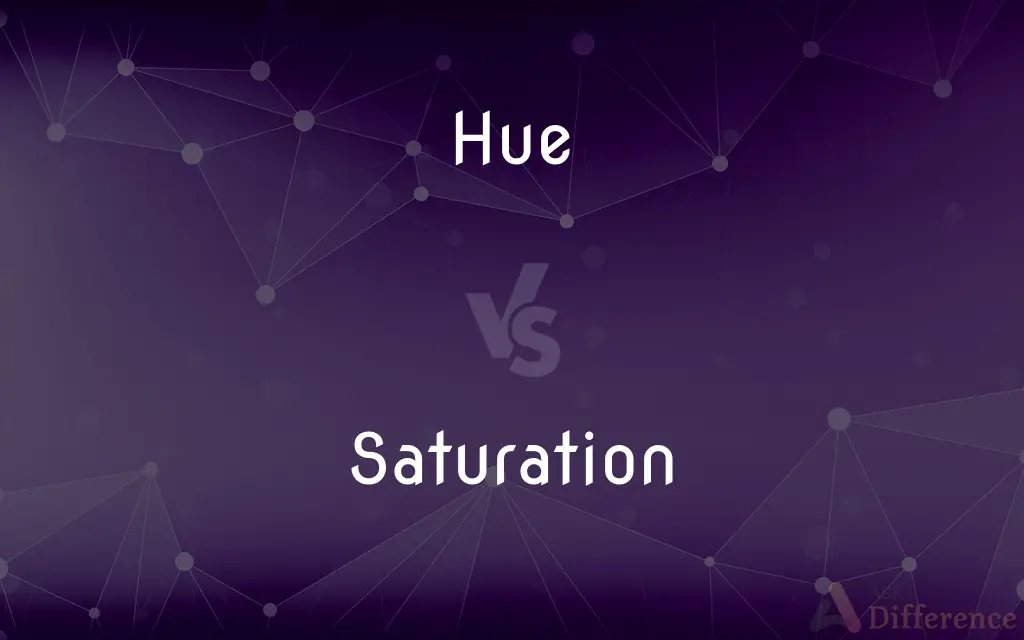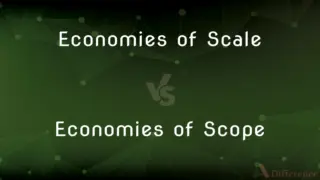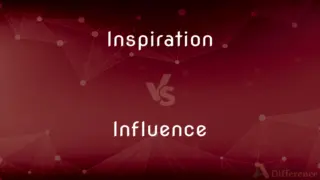Hue vs. Saturation — What's the Difference?
By Tayyaba Rehman — Published on October 4, 2023
Hue refers to the dominant color perceived, the base of a color, represented as an angle. Saturation defines the brilliance and intensity of a color, how far it is from neutral.

Difference Between Hue and Saturation
Table of Contents
ADVERTISEMENT
Key Differences
Hue and Saturation are integral components in the representation and perception of color in design and photography. Hue essentially refers to the color itself, the quality that defines and distinguishes one color from another. It is what people generally mean when they refer to "color," indicating whether something is red, blue, green, etc.
Saturation, on the other hand, refers to the intensity or purity of a color. It represents how much of a hue is present in a color and is devoid of white, black, or gray. A fully saturated color is pure, meaning it contains no white, black, or gray, and desaturated colors are closer to gray, appearing more washed out.
The interaction between Hue and Saturation is crucial for achieving the desired visual effects in design and art. A hue can be visually modified by altering its saturation level. For example, increasing the saturation of a hue will make the color appear more vibrant and decreasing it will make the color appear more muted.
Understanding the concepts of Hue and Saturation is crucial for anyone working with color, whether it be in design, photography, or art. Mastery of these elements allows for the creation of visually stunning and harmonious color schemes, enabling the conveyance of desired moods, tones, and atmospheres effectively.
Comparison Chart
Definition
The basic attribute of a color, determining the color itself.
The intensity or purity of a color.
ADVERTISEMENT
Represents
Color family or spectrum such as red, blue, yellow, etc.
Degree to which the hue is undiluted by white light.
Visual Effect
Determines the type of color seen.
Determines the vibrancy or dullness of a color.
Measurement
Represented as an angle (0° to 360°) on the color wheel.
Represented as a percentage from 0% (gray) to 100% (full color).
Adjustment Result
Changes the base color.
Alters the intensity or vibrancy of the color.
Compare with Definitions
Hue
A term representing the base attribute of a color, indicating which color family it belongs to.
The hue of a ripe tomato is red.
Saturation
Refers to the intensity or vividness of a color.
Increasing the saturation makes the color look more vibrant.
Hue
The specific color observed in the color spectrum, such as red, blue, or yellow.
The flowers had a vibrant blue hue.
Saturation
The extent to which a hue appears rich or pale in a visual element.
The saturation of the image was adjusted to make it appear more lively.
Hue
A color’s position on the color wheel or spectrum, measured in degrees.
A hue of 0° is red on the color wheel.
Saturation
A measurement of color vibrancy or how far a color is from its neutral gray.
Lowering the saturation will make the colors appear more muted.
Hue
The quality by which we distinguish one color from another, associated with the dominant wavelength of light.
The hue of the sky changes as the sun sets.
Saturation
A term describing the purity of a color, with higher values indicating less dilution by light.
The saturation of the paint determined how bright the wall color appeared.
Hue
Represents the pure spectrum of colors in the color wheel without the addition of white or black.
Artists often start with primary hues to create a palette.
Saturation
The act or process of saturating.
Hue
In color theory, hue is one of the main properties (called color appearance parameters) of a color, defined technically in the CIECAM02 model as "the degree to which a stimulus can be described as similar to or different from stimuli that are described as red, orange, yellow, green, blue, purple," which in certain theories of color vision are called unique hues. Hue can typically be represented quantitatively by a single number, often corresponding to an angular position around a central or neutral point or axis on a color space coordinate diagram (such as a chromaticity diagram) or color wheel, or by its dominant wavelength or that of its complementary color.
Saturation
The condition of being saturated.
Hue
The property of colors by which they can be perceived as ranging from red through yellow, green, blue, and violet, as determined by the dominant wavelengths of the light being reflected, transmitted, or emitted. See Table at color.
Saturation
The condition of being full to or beyond satisfaction; satiety.
Hue
A particular gradation of color; a shade or tint.
Saturation
(Physics) A state of a ferromagnetic substance in which an increase in applied magnetic field strength does not produce an increase in magnetization.
Hue
Color
All the hues of the rainbow.
Saturation
(Chemistry) The state of a compound or solution that is fully saturated.
Hue
Appearance; aspect
A man of somber hue.
Saturation
(Meteorology) A condition in which air at a specific temperature contains all the water vapor it can hold; 100 percent relative humidity.
Hue
A color, or shade of color; tint; dye.
Saturation
Vividness of hue; degree of difference from a gray of the same lightness or brightness. Also called intensity. See Table at color.
Hue
The characteristic related to the light frequency that appears in the color, for instance red, yellow, green, cyan, blue or magenta.
In digital arts, HSV color uses hue together with saturation and value.
Saturation
Intensive shelling or bombing of a military target to achieve total destruction.
Hue
(figuratively) A character; aspect.
Saturation
The flooding of a market with all of a commodity that consumers can purchase.
Hue
(obsolete) Form; appearance; guise.
Saturation
The act of saturating or the process of being saturated
Hue
(obsolete) A shout or cry.
Saturation
(physics) The condition in which, after a sufficient increase in a causal force, no further increase in the resultant effect is possible; e.g. the state of a ferromagnetic material that cannot be further magnetized
Hue
Color or shade of color; tint; dye.
Hues of the rich unfolding morn.
Saturation
(chemistry) The state of a saturated solution
Hue
A predominant shade in a composition of primary colors; a primary color modified by combination with others.
Saturation
(chemistry) The state of an organic compound that has no double or triple bonds
Hue
A shouting or vociferation.
Saturation
(meteorology) The state of the atmosphere when it is saturated with water vapour; 100% humidity
Hue
The quality of a color as determined by its dominant wavelength
Saturation
(art) The intensity or vividness of a colour.
Hue
Take on color or become colored;
In highlights it hued to a dull silver-grey
Saturation
(color) Chromatic purity; freedom from dilution with white.
Hue
Suffuse with color
Saturation
Intense bombing of a military target with the aim of destroying it
Saturation
The flooding of a market with all of a product that can be sold
Saturation
(music) An effect on the sound of an electric guitar, used primarily in heavy metal music
Saturation
(telecommunications) The condition at which a component of the system has reached its maximum traffic-handling capacity, i.e. one erlang per circuit.
Saturation
(telecommunications) The point at which the output of a linear device, such as a linear amplifier, deviates significantly from being a linear function of the input when the input signal is increased.
Modulation often requires that amplifiers operate below saturation.
Saturation
The act of saturating, or the state of being saturating; complete penetration or impregnation.
Saturation
The act, process, or result of saturating a substance, or of combining it to its fullest extent.
Saturation
Freedom from mixture or dilution with white; purity; - said of colors.
Saturation
The process of totally saturating something with a substance;
The impregnation of wood with preservative
The saturation of cotton with ether
Saturation
The act of soaking thoroughly with a liquid
Saturation
A condition in which a quantity no longer responds to some external influence
Saturation
Chromatic purity: freedom from dilution with white and hence vividness of hue
Saturation
Represents the degree to which a color is undiluted by white light.
High saturation levels mean the color is closer to its pure form.
Common Curiosities
What does hue mean in terms of color?
Hue refers to the dominant color perceived, the basic attribute of a color.
How is saturation different from hue?
Saturation refers to the intensity or purity of a color, while hue refers to the color itself.
Is hue the same as color?
Essentially yes, hue is the quality by which we distinguish colors, it's the color itself.
Can saturation affect the mood conveyed by a color?
Absolutely, higher saturation can convey energy and vibrancy, while lower saturation can convey subtlety and calmness.
Can adjusting the hue alter the perceived color?
Yes, adjusting the hue will change the perceived base color.
Does increasing saturation make a color brighter?
Yes, increasing saturation makes the color appear more vibrant and intense.
How is saturation represented in digital media?
Saturation is usually represented as a percentage, ranging from 0% (gray) to 100% (fully saturated color).
Is it possible to have high saturation in a dark color?
Yes, a color can be dark but also highly saturated, meaning it is a pure, intense version of the hue.
Can hue be measured?
Yes, hue is often measured as an angle on the color wheel, ranging from 0° to 360°.
Share Your Discovery

Previous Comparison
Economies of Scale vs. Economies of Scope
Next Comparison
Inspiration vs. InfluenceAuthor Spotlight
Written by
Tayyaba RehmanTayyaba Rehman is a distinguished writer, currently serving as a primary contributor to askdifference.com. As a researcher in semantics and etymology, Tayyaba's passion for the complexity of languages and their distinctions has found a perfect home on the platform. Tayyaba delves into the intricacies of language, distinguishing between commonly confused words and phrases, thereby providing clarity for readers worldwide.
















































